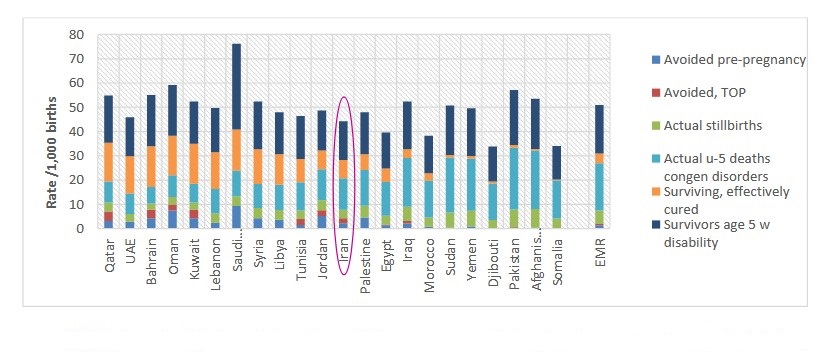Introduction
The Pediatric Inherited Diseases Research Center (PIDRC) of Isfahan University of Medical Sciences was established in 2011. Focusing on diseases that can have a hereditary aspect, this center explores issues such as the genetic and molecular basis of these diseases and the risk of reoccurrence in families and tries to use the knowledge and capacity of the experts in the related fields to meet needs of the society.
In today's world, human knowledge is rapidly changing and growing, and health, as one of the axes of sustainable development, plays an important role in the growth and excellence of human societies, and therefore the aims and scopes of our research center would be beneficial for advancement of the society. The graphs and Tables below show some indicators of children's hereditary diseases in EMRO countries, and the statistics of Iranian children's hereditary diseases can also be seen among the other countries.

Figure 1- Estimating the birth prevalence of congenital abnormalities and diseases of children in Iran and other countries in the Eastern Mediterranean Region(EMR)

Figure2-Estimating the consequences of congenital anomalies and diseases in the first 5 years of life in Iran and other EMR countries
In the meantime, research centers can play a mission and influencing role as a knowledge production platform to respond to the ever
increasing need in the fields of pediatric health.
Vision
Pediatric Inherited Diseases Research Center of Isfahan University of Medical Sciences aims to become one of the leading national and international research centers in the field of pediatric health. Healthy generation would be an essential factor for the advancement of any society and the research activities being conducted by PIDRC is governing the achievement of this goal.
Prophecy
In line with its vision, the PIDRC undertakes the following missions to the best of its ability:
A-Leadership and implementation of applied-developmental research in the field of determinants of genetic diseases
B-Communication and cooperation with other organizations and universities involved in biomedical health profession.
C- Identifying innovators and encouraging and supporting them in the field of applied research.
D- Applying all basic and clinical researches to meet the real needs of the society and active and effective presence in the global scientific communities.
E- Take necessary action towards the awareness of the target community about preventive measures to control the prevalence of hereditary and metabolic diseases.
F- Conducting scientific and applied researches in order to improve the quality and quantity of healthcare services, reduce the burden of hereditary diseases in the society, improve clinical services, produce and advance modern medical knowledge.
G-Using available resources to train young research fellow
Values
1- Compliance with ethical standards in the matter of research and publication of scientific materials
2- Pay attention and hold responsibility towards human rights and dignity
3- Defining research projects in compliance with the needs of the society and providing beneficial services.
4- Continuous empowerment of the research team members.
5- Paying attention to group research and teamwork to improve the spirit of collective participation and cooperation.
6- Supporting the vulnerable groups of the society with the approach of social justice in health and reducing inequalities in health
Targets
1- Production and dissemination of knowledge about determinant factors responsible for pediatric hereditary diseases.
2- Development of interdepartmental partnerships in line with effective research on the treatment of children's hereditary diseases.
3- Increasing people's motivation to participate and collaborate for adopting healthy life style and avoiding high risk behaviors that may cause the occurrence of inherited diseases.
4- Development of research infrastructure such as financial resources, comprehensive and up-to-date information, appropriate equipment and technology, applied research and management and competent staff to establish the clinical governance system of the university.
5- Development and induction od appropriate screening tests for the prevalent inherited diseases in order to identify the at-risk people in the society.
6- Increasing the effectiveness of lifestyle modification interventions: starting interventions at a younger age for people at risk of the family and due to greater educability at a younger age, creating a change in behavior in children compared to adults and as a result modifying their lifestyle.
7- Identification of monogenic cases among non-communicable multifactorial diseases and then identification of people at risk in the family and relatives and develop preventive intervention.
8- Setting up and promoting quantitative and qualitative research in the field of determinants of children's hereditary diseases
9- Support applied research related to children's hereditary diseases
10-Empowering faculty members and university researchers in the field of community-oriented research and strengthening inter-departmental collaborations.
Analysis of the factors affecting the prevention of hereditary diseases
- Health and lifestyle
- Genetic counseling: investigating the possibility of genetic diseases in people
- Nutrition: food health, eating patterns, habits, thinness and obesity
- Physical activity: exercise
- Physical and mental health: mental and emotional health, resilience, happiness, personal and social relationships, life skills, health checkups
- High-risk behavior patterns: smoking, addictive substances and alcohol
- Fetal and pregnancy health: smoking, alcohol and drug use by the mother - family marriage - mental and physical diseases of the mother - genetic disease - intrauterine infections - multiple births - premature birth
- Environmental pollution, environmental health, excessive use of agricultural fertilizers and pesticides, polluted industrial effluents, drought and climate change, vehicle pollution, waste recycling, burying or burning waste, absorption wells for sewage disposal
Affiliation
Pediatric Inherited Diseases Research Center, Research Institute for Primordial Prevention of Non-Communicable Disease, Isfahan University of Medical Sciences, Isfahan, Iran
.....

